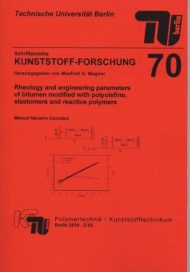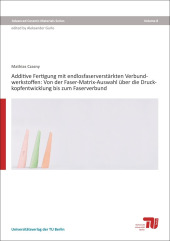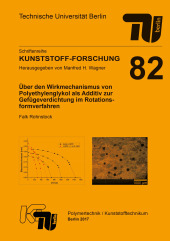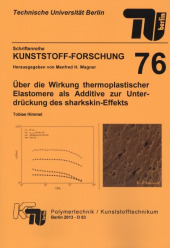Rheology and engineering parameters of bitumen modified with poyolefins, elastomers and reactive polymers

Size: 195 pages
Format: 14,8 x 21,0 cm
Format: 14,8 x 21,0 cm
Reihe: Schriftenreihe Kunststoff-Forschung ; 70
ISBN 978-3-7983-2229-5
5,00 €
Two of the most significant failures of asphalt roads are formation of ruts in the pavement surface due to highly concentrated loads at high temperatures, and cracking of the outer asphalt layer especially at low temperatures. In the last years, polymers are used as bitumen modifiers to delay the formation of ruts as well as for improving the resistance against cracking. In this work, by using rheological characterization of polymer modified bitumen (PmB), the efficiency of a multitude of different polymers and polymeric materials in retarding the rutting process and in decreasing the cracking susceptibility is reported. The polymer additives investigated include thermoplastics, e.g. ultrahigh molecular weight
polyethylene (UHMWPE), polyethylene (PE), and polypropylene (PP), reactive polymers as e.g. polyphosphoric acid and co-polymers of polymethylacrylate and butylacrylate, chopped fibers of poly(ar-amide) and poly(ar-ester), and elastomers such as e.g. styrene-butadienestyrene (SBS), ethylene-vinyl-acetate (EVA) and ground rubber. Rheological characterization of polymer modified bitumen was carried out mostly within the linear viscoelastic regime, at
different temperatures and frequencies, in addition to creep and creep recovery tests, and the results of the rheological tests were used to evaluate the modifying influence of polymer addition to bitumen. Selected formulations of PmB with improved rheological properties were analyzed by use of the Hamburg wheel testing equipment, simulating real asphalt applications. Experiments to improve polymer dispersion in bitumen showed that the time required dispersing SBS in hot bitumen and obtaining a storage stable dispersion can be significantly reduced by pre-gelling SBS in asphalt compatible oil. Additionally the effect of
devulcanization of ground rubber from recycled tires before mixing with bitumen was studied. The storage stability of polymer modified bitumen samples was characterized experimentally, leading to the proposal of two storage stability indices. One index is based on the loss tangent obtained from temperature sweep experiments in oscillatory shear, and a second index is based on the loss tangent obtained by frequency sweep experiments. These indices allow characterizing quantitatively the storage stability of polymer-modified bitumen.
Both indices can be obtained easily, showing excellent correlation between each other. Additional optical and thermal analyses were carried out to evaluate the storage stability of PmB. Differential scanning calorimetry is especially adequate to analyze the storage stability of bitumen modified with thermoplastic polymers. A new parameter is proposed for replacing the so-called “rutting parameter” commonly used in field, which is reported to fail when high quantities of polymer are dispersed in bitumen. This newly proposed parameter is based on the complex viscosity, and allows obtaining a “maximum temperature before rutting”, TRut, even at high concentrations of polymer. This new concept of TRut based on rapid rheological testing can easily be used by industrial laboratories.



